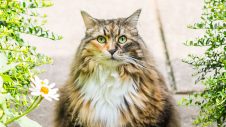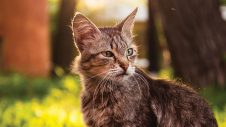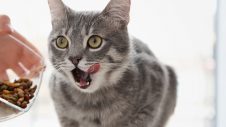It can be hard to resist the temptation to feed our cats or give them treats when they turn on the feline charm. However, obesity in cats is a serious issue that can lead to arthritis, diabetes, urinary tract disease and other health problems. The best way to prevent or reverse this condition is, just like humans, with diet and exercise.
Why do cats become overweight?
Like humans, cats gain weight based on two main factors — how much they eat and how active they are. We often confine cats to our homes, which is quite a reasonable thing to do both for their safety and that of wildlife species. However, this means cats might not exercise as much as they should. Lack of exercise or inactivity also leads to boredom, which can result in overeating or begging for more food.
Other factors contributing to weight gain include:
- Being the only cat in the household with no one to play with.
- Being male.
- Being desexed.
- Being overfed.
How will my cat behave on a diet?
Cats are known for their aloof nature, so you’d be forgiven for thinking your cat may become upset if their calories are restricted. However, cats may actually exhibit more affectionate behaviour when fed a calorie-restricted diet. When they’re healthier, they will feel it and often become happier and more loving. It could take some time for your cat to get used to their new diet, but the health benefits of weight loss for overweight and obese cats are worth it.
Dr Roslyn Lui from Greencross Vets Werribee also indicates that cats will continue to come home as long as they’re fed.
“Cats basically treat owners as a food source,” she says. “So as long as your cat is getting food and love consistently from you, from a survival point of view, they will continue to come home. Being a pet means security, safety, warmth, shelter, water, food, and lots of love. I don’t think it’s anything to be concerned about.”
Choosing the right food
It’s important to keep your cat’s health and best interest in mind. Your vet may recommend feeding your cat a special food to assist with healthy weight loss. There are superior calorie-controlled diets available that are designed to help your cat maintain a healthy weight. These diets contain high protein and lots of fibre to help your cat feel full and satisfied whilst reducing their calorie intake. A specially formulated food may also reduce begging behaviour, which can be hard to resist.
Speak with your local Greencross Vets team; they can recommend tips to help your cat maintain a healthy weight and a diet best suited to your feline friend.
How to tell if your cat is overweight
Your cat’s weight can fluctuate, just like that of humans, usually due to too much or too little food or over- or under-exercising. Use this infographic to check for signs of a weight problem in your pet. If you’re not sure what your pet’s ideal weight is, talk to your local Greencross Vets today; we’re here to help!

Your local Greencross Vets can advise on the best ways to help your cat maintain a healthy weight.

 Greencross Vets
Greencross Vets 








